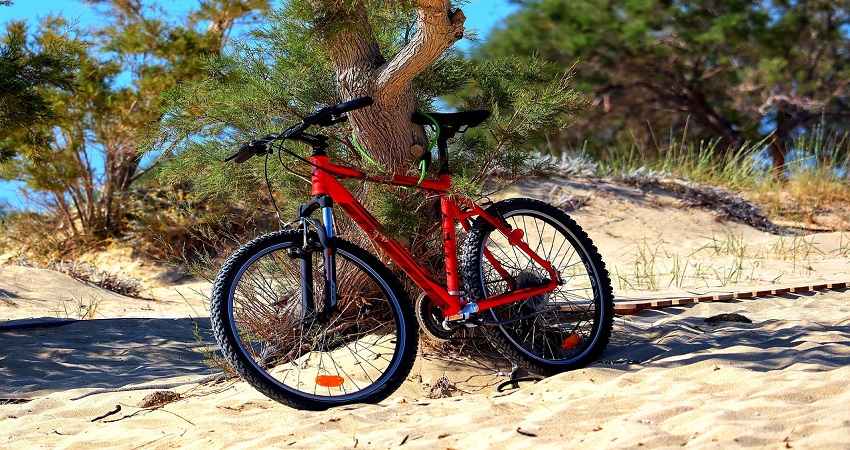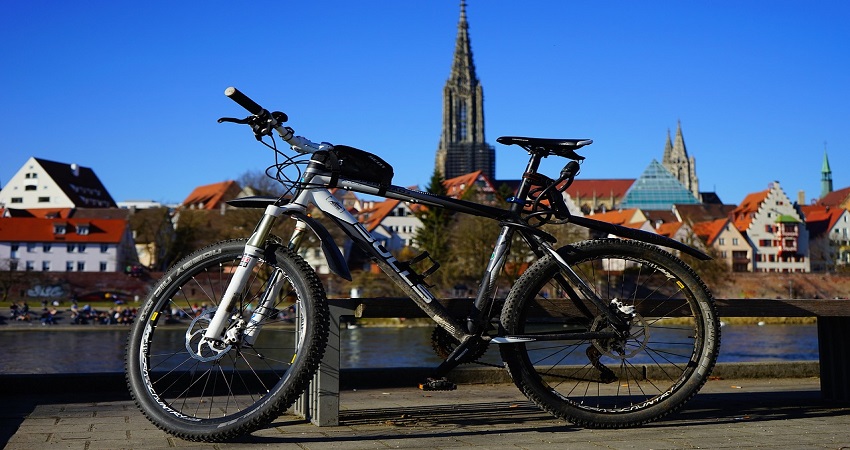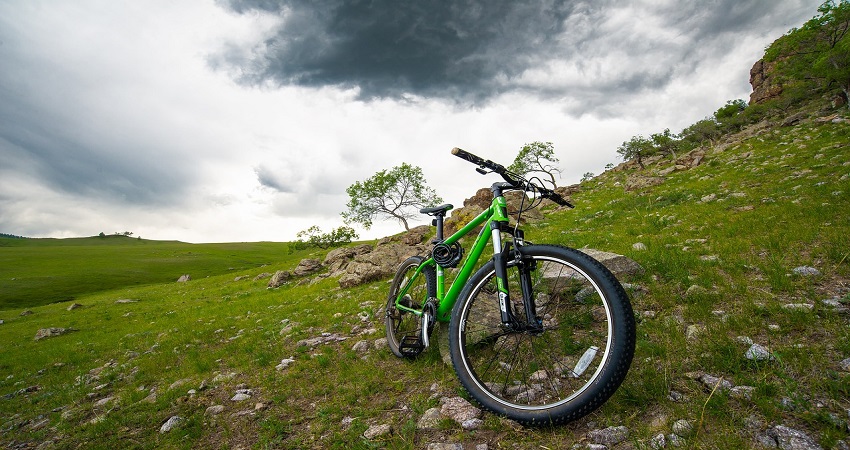Yes, mountain bikes can be used for commuting, but they are not as efficient as road bikes for long distances on paved roads. Mountain bikes are designed for off-road trails, with suspension to absorb bumps but also with added weight, which can slow down the rider on smooth surfaces.
However, they can still be used for commuting, particularly if the route includes rough terrains, gravel paths, or dirt roads. For those looking to commute with a mountain bike, there are considerations to make, such as tire selection, suspension adjustment, and bike locks.
While not as optimal as road bikes for long-distance commuting, mountain bikes can still be a viable choice for individuals who occasionally need to navigate rugged terrain as part of their daily commute.
Exploring The Versatility Of Mountain Bikes
Mountain bikes are well-known for their off-road capabilities, conquering rugged terrains, and providing an exhilarating ride through challenging landscapes. However, the versatility of mountain bikes extends beyond just trail riding. In this article, we delve into whether mountain bikes can be used for commuting, and examine the various terrains where these bikes excel, highlighting their adaptable nature for diverse riding needs.
Introduction To Mountain Bikes
Mountain bikes, often characterized by their sturdy frame, knobby tires, and front suspension, are primarily designed for off-road cycling. They are built to withstand the demands of rough and uneven terrains, offering riders stability and control over unpredictable surfaces. Despite their off-road prowess, mountain bikes can also serve as reliable commuting options, thanks to their durability and adaptability.
Typical Terrains Mountain Bikes Excel In
Mountain bikes excel in various terrains, including:
- Rugged Trails: Ideal for navigating rocky, muddy, or uneven trails
- Dirt Roads: Suited for handling unpaved dirt paths and gravel trails
- Urban Environment: Provide comfort and stability during city commuting
- Mountainous Areas: Capable of conquering steep inclines and descents
Adapting Mountain Bikes For Commuting
Mountain bikes are renowned for their versatility and durability, making them a popular choice for off-road adventures. But can mountain bikes be used for commuting? The answer is a resounding yes! With a few adjustments, your mountain bike can be transformed into the perfect urban commuting machine. In this article, we will discuss some key modifications you can make to optimize your mountain bike for city roads.
Optimizing Tires For Urban Use
One of the first things you should consider when adapting your mountain bike for commuting is the tires. Mountain bike tires are typically designed for off-road grip and durability, which may not be ideal for smooth, paved urban roads.
To optimize your bike for urban use, consider switching to tires specifically designed for commuting. These tires are typically smoother and narrower, offering reduced rolling resistance and improved efficiency. With a set of slick or semi-slick tires, you can enjoy a faster and smoother ride on the city streets.
Adjusting Suspension For City Roads
The suspension system on a mountain bike is designed to absorb shocks and vibrations on rough terrains. However, for commuting on city roads, you may not need as much suspension travel. Excessive suspension can lead to energy loss and reduced efficiency on smooth surfaces.
Consider adjusting the suspension forks and rear shock on your mountain bike to a firmer setting or even opting for a rigid fork altogether. This adjustment will allow you to transfer more power to the pedals, resulting in a more efficient and comfortable ride during your urban commute.
Choosing The Right Accessories For Commuting
When using a mountain bike for commuting, it’s essential to choose the right accessories to enhance your ride. Start with a reliable set of lights to ensure visibility and safety during low-light conditions. Additionally, investing in a sturdy rear rack or panniers will allow you to carry your essentials comfortably.
Fenders are also a necessary accessory to protect you from splashes on wet roads. Lastly, a quality bike lock is crucial to secure your mountain bike while at work or running errands in the city.
By adapting your mountain bike for commuting and making these adjustments, you can enjoy the best of both worlds – the ruggedness of a mountain bike and the practicality of a commuter bike. So why not dust off your mountain bike and turn it into your new trusty companion for your daily urban adventures?
Comparing Mountain Bikes With Road Bikes
Considering using mountain bikes for commuting? While it’s possible, road bikes are more ideal for daily road usage due to their efficiency and speed. Mountain bikes, with their suspension and rugged design, excel off-road on gravel, dirt, and rocky terrains.
Balancing between comfort and speed is key.
Differences In Design And Purpose
Mountain bikes and road bikes are designed for different purposes and terrains, making them distinct in terms of their design and functionality. Mountain bikes are built to handle rough terrains, such as muddy, rocky singletrack trails, dirt roads, and gravel paths.
They come with features like suspension systems, wide tires with knobby treads, and sturdy frames to absorb shocks and provide stability on uneven surfaces.
On the other hand, road bikes are designed for fast, smooth rides on paved surfaces. They have lightweight frames, narrow tires with minimal tread, and aerodynamic features to improve speed and efficiency on roads. These design differences reflect their intended use and the type of terrain each bike is best suited for.
Pros And Cons For Road Use Vs. Off-road Use
Road Use:
Pros:
- Efficiency: Road bikes are built for speed and efficiency on paved surfaces, allowing you to cover long distances quickly.
- Aerodynamics: The aerodynamic design of road bikes reduces wind resistance, making it easier to maintain higher speeds.
- Lightweight: Road bikes are typically lighter than mountain bikes, making them easier to maneuver and handle.
Cons:
- Limited Terrain: Road bikes are not suitable for off-road use, limiting your options to paved surfaces only.
- No Suspension: Road bikes lack suspension systems, which can be uncomfortable on rough or uneven surfaces.
- Less Durability: The lightweight nature of road bikes means they may not withstand the rigors and impacts of off-road riding.
Off-Road Use:
Pros:
- Versatility: Mountain bikes excel in off-road terrains, offering the freedom to explore diverse and challenging trails.
- Shock Absorption: The suspension systems on mountain bikes absorb shocks, providing a smoother ride on rough surfaces.
- Stability: The wide tires and sturdy frames of mountain bikes offer better stability and control on unpredictable terrains.
Cons:
- Slower on Pavement: The wider tires and heavier frames of mountain bikes can make them slower and less efficient on paved roads.
- Less Aerodynamic: Mountain bikes are not designed for maximum speed on roads, lacking the aerodynamic features of road bikes.
- Heavier Weight: Mountain bikes are generally heavier than road bikes, which can make uphill climbs more challenging.
In conclusion, mountain bikes can be used for commuting, but it’s important to understand the differences between mountain bikes and road bikes. While mountain bikes excel in off-road terrains, offering versatility and shock absorption, they may not be as efficient or suitable for long-distance road riding.
Road bikes, with their lightweight frames and aerodynamic design, are ideal for smooth paved surfaces and faster rides. Consider your intended use and the type of terrain you’ll be riding on before deciding between a mountain bike or a road bike for commuting.
Long-distance Travel On Mountain Bikes
Utilizing mountain bikes for long-distance travel presents a unique set of challenges and advantages. Whether it’s a journey through scenic countryside or a daily commute to work, mountain bikes can be a viable option for extended rides. However, certain factors such as bike efficiency and practical tips can significantly impact the experience of long-distance travel on mountain bikes.
Efficiency Of Mountain Bikes For Extended Rides
Mountain bikes provide a sturdy and durable option for long-distance travel, especially when encountering diverse terrains. The robust frame and suspension system enable riders to tackle uneven surfaces, offering a more comfortable and controlled riding experience. Additionally, the versatile tread patterns on mountain bike tires provide enhanced traction, making them suitable for a variety of road conditions – from smooth pavements to gravel paths.
Tips For Using Mountain Bikes On Long Road Journeys
- Optimize tire pressure: Adjusting tire pressure based on the riding surface can enhance the efficiency and comfort of the ride.
- Ensure proper suspension setup: Fine-tuning the suspension settings according to the terrain can maximize the bike’s performance and rider comfort.
- Consider bike accessories: Utilizing mudguards, racks, and bags can enhance the practicality of mountain bikes for long-distance journeys, allowing riders to carry essentials and protect against mud and debris.
- Plan the route: Selecting routes that accommodate the capabilities of a mountain bike can lead to a more enjoyable and efficient long-distance travel experience.
Mountain Bikes For Everyday Use
Mountain bikes offer versatility for daily commuting, especially on off-road terrains like gravel or dirt paths. While not as speedy as road bikes, mountain bikes’ suspension cushion bumps, enhancing comfort for everyday use. Consider adapting tires and accessories for smoother urban rides.
Mountain Bikes As Touring Or Commuting Bikes
Mountain bikes can be versatile options for commuting and touring, providing an adventurous twist to your everyday rides.
Comparison To Traditional Commuting Bikes
Compared to traditional commuting bikes, mountain bikes offer more durability and capability to handle various terrains.
Community Insights On Mountain Bike Commuting
Experiences Shared By Mountain Bike Commuters
- Many commuters enjoy the versatility of mountain bikes for urban and off-road travel.
- Mountain bike commuters appreciate the durability and ability to handle various terrains.
- Some commuters find mountain bikes are more comfortable and offer better stability.
Pros And Cons Highlighted By Bike Users
Pros:
- Durable and versatile for different terrain
- Comfortable and stable
- Can be customized for commuting needs
- Handle rough roads and obstacles easily
Cons:
- Heavier than traditional commuter bikes
- Slower on paved roads due to suspension
- May require more maintenance and upkeep
Overcoming Challenges Of Mountain Bike Commuting
When it comes to mountain bike commuting, there are certain challenges that riders may encounter. Overcoming these challenges is crucial for a smooth and enjoyable urban riding experience.
Addressing Speed And Efficiency Concerns
One of the primary concerns for using mountain bikes for commuting is their perceived lack of speed and efficiency compared to traditional commuter bikes. However, with the right adjustments and equipment, mountain bikes can be optimized for urban riding.
By choosing slicker tires with lower rolling resistance, riders can significantly improve the bike’s speed and efficiency on paved roads. Additionally, maintaining proper tire pressure and optimizing suspension settings can contribute to a smoother and swifter commuting experience.
Finding The Balance For Urban Riding
Urban riding requires a delicate balance between maneuverability, comfort, and performance. Mountain bikes, known for their robust build and suspension systems, may seem overbuilt for city streets.
However, with proper setup and adjustments, such as fine-tuning suspension settings to minimize bobbing and improve pedal efficiency, mountain bikes can offer a comfortable and controlled ride in urban environments. Accessories like mudguards and racks can also be added to enhance the practicality of mountain bikes for commuting.
Final Considerations For Using Mountain Bikes In Commuting
Mountain bikes can indeed be used for commuting, especially when the route involves off-road or rugged terrains such as muddy trails or gravel paths. While mountain bikes may not be as efficient as road bikes for long distances solely on paved surfaces, they are versatile and suitable for everyday use.
Critical Factors To Evaluate Before Commuting
When considering using a mountain bike for commuting, there are several crucial factors that need to be evaluated before making a decision. These factors can greatly impact your overall commuting experience and ensure that your mountain bike is suitable for daily transport.
One important factor to consider is the condition of the roads and terrain you will be commuting on. Mountain bikes are built to handle rough and uneven surfaces such as dirt roads, gravel paths, and rocky trails. If your commute mainly consists of paved roads and smooth surfaces, a mountain bike may not be the most efficient choice.
Another factor to evaluate is the distance of your commute. Mountain bikes are generally heavier and slower compared to road bikes, which are designed for speed and long-distance riding on paved roads. If you have a long daily commute, you may find that a mountain bike requires more effort and may be more tiring over time.
Making Informed Decisions Based On Individual Needs
Ultimately, the decision of whether a mountain bike is suitable for commuting depends on your individual needs and preferences. While mountain bikes may not be the most optimized choice for daily commuting, they can still be a viable option for certain individuals.
If you enjoy the versatility of a mountain bike and appreciate its ability to handle a variety of terrain, using it for commuting can offer you the flexibility to explore alternative routes and take on different challenges.
Additionally, if your commute involves portions of off-road or unpaved paths, a mountain bike can provide the stability and traction needed to navigate such surfaces. It’s also worth considering any additional modifications or accessories that can enhance your mountain bike’s suitability for commuting.
Simple upgrades like slick tires, fenders, racks, and lights can make your mountain bike more efficient, comfortable, and practical for daily transportation.
In conclusion, while mountain bikes may not be the most conventional choice for commuting, they can still be used effectively depending on your specific commuting needs. Evaluating critical factors such as road conditions, commute distance, and personal preferences will help you make an informed decision about using a mountain bike for your daily transportation.
Whether you choose a mountain bike or a more traditional commuting bike, what’s most important is finding a bike that suits your individual needs and enhances your overall commuting experience.
Frequently Asked Questions
Is It Okay To Use A Mountain Bike On The Road?
Yes, it is okay to use a mountain bike on the road. Mountain bikes are suitable for riding on paved surfaces as well as off-road terrains.
Are Mountain Bikes Good For General Use?
Mountain bikes are suitable for general use, but not ideal for long road distances. They excel on off-road terrains like trails, dirt tracks, and gravel paths due to their suspension.
Can You Use A Mountain Bike For Casual Riding?
Yes, mountain bikes can be used for casual riding, but are not as efficient as traditional bikes.
Can Mountain Bikes Be Used For Long Distance?
Yes, mountain bikes can be used for long distances, but they may be slower than road bikes due to their design for off-road terrains.
Conclusion
Mountain bikes can definitely be used for commuting. With the right adjustments, such as changing tires and adding mudguards, they can adapt to urban riding and provide a reliable mode of transportation. However, for strictly road-based commutes, a hybrid or road bike may offer a more efficient option.




